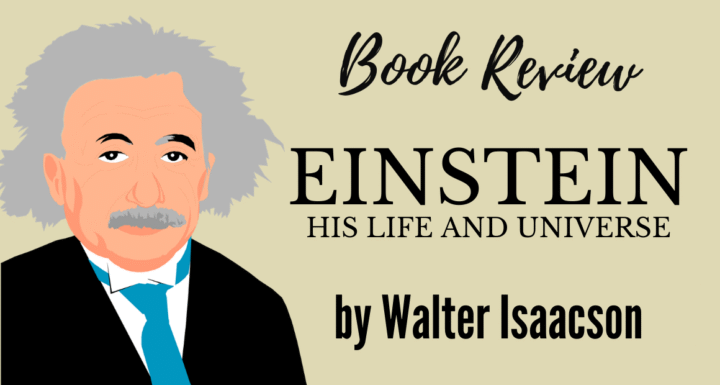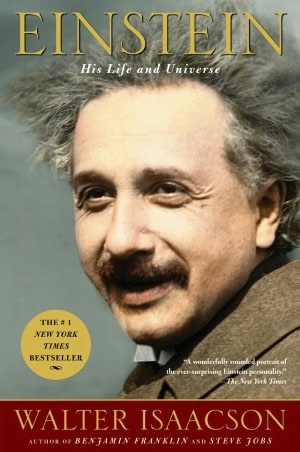Title: Einstein- His Life and Universe
Author: Walter Isaacson
Publisher: Simon Schuster
Genre: Biography, Science
First Publication: 2007
Language: English
Book Summary- Einstein: His Life and Universe by Walter Isaacson
How did his mind work?
What made him a genius?
Einstein: His Life and Universe by Walter Isaacson shows how Einstein’s scientific imagination sprang from the rebellious nature of his personality. His fascinating story is a testament to the connection between creativity and freedom.
Based on newly released personal letters of Einstein, this book explores how an imaginative, impertinent patent clerk—a struggling father in a difficult marriage who couldn’t get a teaching job or a doctorate—became the mind reader of the creator of the cosmos, the locksmith of the mysteries of the atom, and the universe. His success came from questioning conventional wisdom and marveling at mysteries that struck others as mundane. This led him to embrace a morality and politics based on respect for free minds, free spirits, and free individuals.
These traits are just as vital for this new century of globalization, in which our success will depend on our creativity, as they were for the beginning of the last century, when Einstein helped usher in the modern age.

Book Review – Einstein: His Life and Universe by Walter Isaacson
Walter Isaacson has been my favorite biographer. His previous works, Steve Jobs and The Innovators, fascinated me so much that I want to read Einstein: His Life and Universe and it was worth the time. Isaacson is so incredible in his effort to make every details perfect. As soon as I started this one, I knew I was in right hands.
I believe no other scientists have enjoyed so much popularity and stardom as Einstein did both in his lifetime and even many years after his death. As per the popular belief, his name is intertwined with the word “Genius”. This biography is not mere stories about his great intellectual creativity but also a reflection of the person “Einstein” — both his good and flawed sides.
“To dwell on the things that depress or anger us does not help in overcoming them. One must knock them down alone.”
Einstein has been quite an unusual person in personal life. He has been a difficult son, husband and father. He revered individualism and personal freedom so much that it added an indifference in his attitude for people close to him. Whenever he would feel confined or caged in relations, he would wall them out. The awful thing about life is this: everyone has his/her own reasons, which makes nothing right, nothing wrong. So it’s difficult to judge his response to his first wife Mari & younger son Eduard.
He has been a nonconformist and rebel in his pursuit of science and towards his feeling about politics. His rebellious and nonconformist nature led him to the invention of theory of relativity by leaving classical concept of absolute time and space. But as time went by he himself turned into a reactionary from rebel in the question of accepting dynamic aspects of quantum mechanics.
His lifelong passion and work for formulating a unified field theory is worth mentioning.
“The value of a college education is not the learning of many facts but the training of the mind to think”
Einstein’s pacifism, world federalism, and aversion to nationalism were part of a political outlook that also included a passion for social justice, a sympathy for underdogs, an antipathy toward racism, and a predilection toward socialism. The Nazi militarism, anti-semitic feelings and extreme nationalism bonded him more closely with his Jewish ties. Even he was offered the position of President of the newly formed Israel after its first president passed away, which he refused benignly.
His reverence for individualism and freedom made him cherish his American citizenship because of its constitutional promise to preserve individual rights and freedom. But due to his anti-war feelings and support for pacifism, his integrity to USA was often questioned to find any possible ties between him & communism. The FBI accumulated tons of files about him over the years but in vain.
“A society’s competitive advantage will come not from how well its schools teach the multiplication and periodic tables, but from how well they stimulate imagination and creativity.”
During second world war when Szilard approached him with the fear that the Germans might be experimenting with the idea of a nuclear bomb, then Einstein took initiative to aware president Roosevelt of this mighty weapon. His constant initiative eventually launched the Manhattan project but because his integrity was questioned in the fear of any possible tie with communism, no secret information about this or any other project was ever shared with him. Later on Einstein took strong position against the blind politically waged use of arms.
On the other hand communists denounced him blaming his want for a unified World federation as capitalist propaganda. In this case he suffered the same fate as Charlie Chaplin who was also denounced by both capitalist and communist quarter. In fact Einstein never supported any extremism of either the left or the right wing.
“Politics is for the present, while our equations are for eternity.”
Being equally aware of the goods and evils of both capitalism and communism he preferred social democracy. He thought America’s most dangerous internal threat came not from communist subversives but from those who used the fear of communists to trample civil liberties. Harari expressed similar opinion in his book Sapiens about America’s hysterical hunt for terrorism.
Einstein- His Life and Universe is fantastic. Isaacson presents a brilliant, captivating and detailed assessment of Einstein’s life. We are presented with the picture of an intellectual who isn’t without error, a man haunted by antisemitism and past alliances to radicals and subversives. A man who was principled (most of the time) and contributed a great deal to humanity as both a physicist and humanitarian.
“Science without religion is lame, religion without science is blind.”
That said, whilst in the book Einstein- His Life and Universe the author shows Einstein to be largely on the right side of history, Isaacson does downplay some of Einstein’s faults (cheating, changing his stance on pacifism, and contributing to the A-bomb etc). Likewise, Isaacson is a little too speculative when it comes to Einstein’s religious beliefs, and the science of Einstein’s brain, with a focus on the studies in the late 90’s finding enlarged areas in the brain associated with creativity and intelligence.
The final part of the complete biographies are always touching. It feels something different to see how life finally comes to terms with whatever it has gained over time and there’s a peaceful warmth of glow. Einstein- His Life and Universe is one of the best biographies I read.





